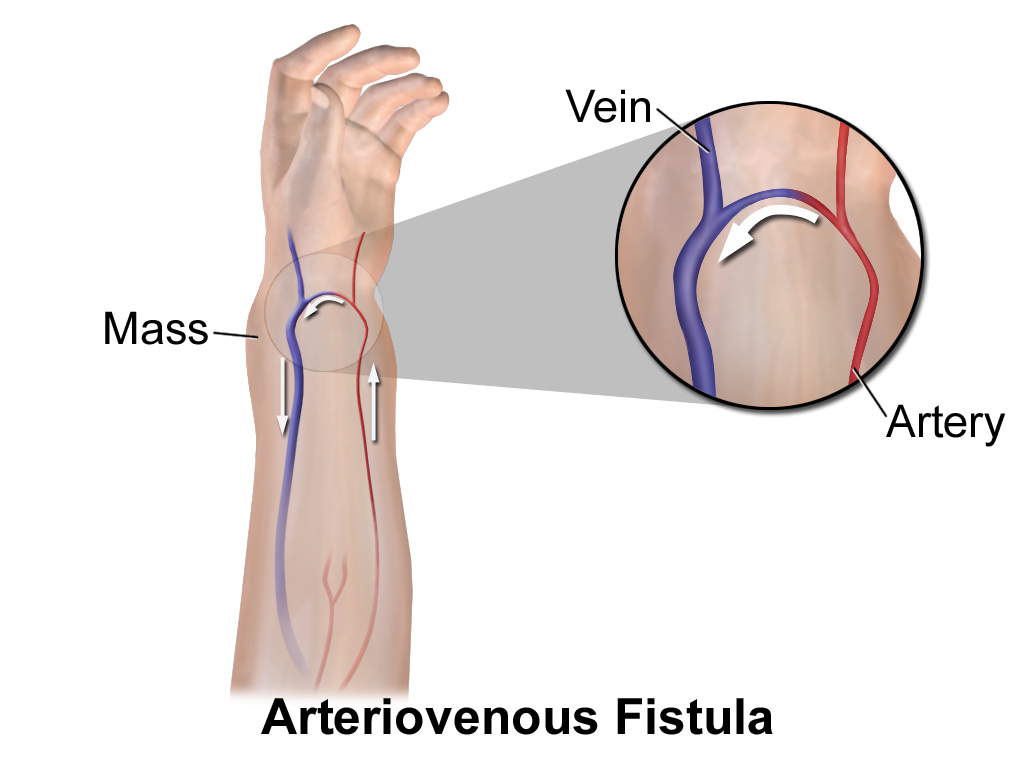
What are Arteriovenous Fistulas?
Arteriovenous fistulas (AVFs) are abnormal connections between an artery and a vein, bypassing the capillary system. This results in direct arterial blood flow into the venous system. AVFs can occur congenitally, as a result of trauma, or as a complication of certain medical procedures or conditions. They can develop in various parts of the body, including the brain, limbs, or organs.
How are Arteriovenous Fistulas diagnosed?
Diagnosing arteriovenous fistulas typically involves a combination of medical history review, physical examination, and diagnostic imaging studies. Common imaging modalities used to diagnose AVFs include Doppler ultrasound, magnetic resonance imaging (MRI), computed tomography (CT) angiography, or conventional angiography. These tests help determine the location, size, and extent of the AVF, as well as assess its impact on surrounding tissues and blood flow.
What are the treatment options for Arteriovenous Fistulas?
The treatment of arteriovenous fistulas depends on factors such as the location, size, and symptoms associated with the AVF, as well as the individual's overall health and functional goals. Treatment options may include observation and monitoring for asymptomatic or small AVFs, minimally invasive procedures such as endovascular embolization or sclerotherapy to close off the abnormal connection, or surgical intervention to repair or remove the AVF, particularly in cases of large or symptomatic AVFs.
Who is a candidate for treatment of Arteriovenous Fistulas?
Individuals who have been diagnosed with arteriovenous fistulas and are experiencing symptoms such as swelling, pain, or impaired blood flow may be candidates for treatment. Common indications for treatment include symptomatic AVFs, AVFs causing complications such as heart failure or ischemia, or AVFs that pose a risk of rupture or hemorrhage. A consultation with a vascular surgeon, interventional radiologist, or vascular specialist is essential to determine the most appropriate treatment approach based on individual circumstances.
What are the benefits of treatment for Arteriovenous Fistulas?
Treating arteriovenous fistulas offers numerous benefits for individuals seeking to relieve symptoms, prevent complications, and improve overall health and quality of life. Proper treatment can help alleviate symptoms such as swelling, pain, or impaired blood flow, reduce the risk of complications such as heart failure or ischemia, and prevent rupture or hemorrhage of the AVF. By addressing AVFs promptly and effectively, individuals can achieve improved vascular function and regain independence.
What is the recovery process like after treatment for Arteriovenous Fistulas?
Recovery from treatment for arteriovenous fistulas varies depending on factors such as the type of treatment performed, the location and size of the AVF, and individual healing factors. Following minimally invasive procedures or surgical intervention, patients may undergo a period of observation, wound healing, and rehabilitation to monitor vascular function, prevent complications, and promote recovery. The timeline for recovery varies for each individual and may take weeks to months, with ongoing monitoring and adjustments to the treatment plan as needed.
What are the risks and complications associated with treatment for Arteriovenous Fistulas?
Like any medical procedure, treatment for arteriovenous fistulas carries certain risks and complications. These may include infection, bleeding, vascular injury, embolization or migration of embolic agents, recurrence of the AVF, or unsatisfactory functional outcomes. Additionally, individuals with complex AVFs or associated medical conditions may be at increased risk for complications. However, the benefits of treatment often outweigh the risks, especially when symptoms significantly impact vascular function and quality of life.
Why choose VMG Hospital for treatment of Arteriovenous Fistulas?
VMG Hospital in Hisar, Haryana, is a trusted provider of comprehensive vascular and interventional radiology care and treatment for individuals with arteriovenous fistulas. Our team of skilled vascular surgeons, interventional radiologists, and vascular specialists has extensive experience in diagnosing and treating AVFs, ensuring timely and effective treatment to optimize outcomes. With state-of-the-art facilities and a patient-centered approach, VMG Hospital is committed to delivering compassionate care and helping patients regain vascular function and improve quality of life after arteriovenous fistulas.